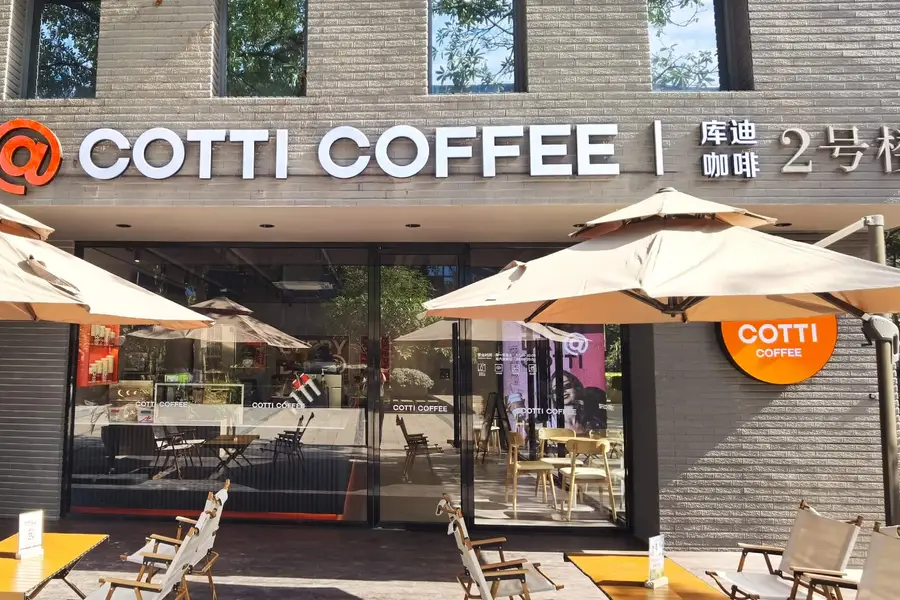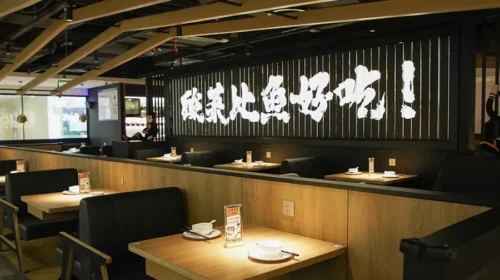Three years after launching Chinese coffee war, Cotti runs low on steam

The country’s second-largest domestic coffee chain has become relatively quiet over the last year, after boasting of plans to open 50,000 stores by the end of this year
Key Takeaways:
- Cotti Coffee had 15,000 stores as of August, far short of the 50,000 it previously targeted by the end of this year
- The company’s opening of its first New York store earlier this year came around the same time as larger rival Luckin entered the market, in largely symbolic moves
By Edith Terry
When Chinese pop culture seeks historical metaphors for the “take-no-prisoners” approach practiced by many of the country’s modern companies, people often look to the Three Kingdoms period from 2,000 years ago. That period ultimately ended with the unification of China under the Jin dynasty, but only after a series of violent wars between neighboring rivals.
As China’s coffee wars go international, its two leading domestic warriors, Luckin (LKNCY.US) and Cotti, are taking their intense rivalry to the global stage, even as the main battlefield remains their home China market where they compete with global giant Starbucks (SBUX.US), not to mention dozens of other domestic and foreign rivals.
And despite hype earlier this year about its entry to New York City, Cotti appears to be rapidly running out of steam in this global Three Kingdoms battle pitting it against Luckin and Starbucks.
Cotti and Luckin launched their first stores in New York almost simultaneously, with the former opening in Brooklyn and Chinatown in May, followed by a Midtown location this month. Luckin, meanwhile, opened its first two U.S. stores in Midtown in June. Both were fast to dump their practice in China of selling cups of premium brew for as little as 9.9 yuan, or about $1.40 per cup, and charged more Starbucks-style prices ranging between $3.50 and $7.
Neither company seemed to mind that coffee prices in the U.S. were touching record highs after President Donald Trump imposed 50% tariffs in July on Brazil, the world’s largest coffee exporter. But then again, the real story between this battle of two aspiring global coffee titans lies in China and other Asian markets closer to home where Starbucks and other Western chains lack the homefield advantage.
The coffee market in Southeast Asia, East Asia and South Asia was worth a hefty $64.2 billion in 2024, which includes $3 billion from China, and is projected to grow by an average of 6.2% annually between 2025 to 2030. That makes the Asia-Pacific region nearly as large as the $67.6 billion U.S. market, which is forecast to grow at a slower annual rate of 5.2% between 2025 and 2030, according to research company Grand View Horizon.
And indeed, the Asia region outside China is rapidly shaping up as the next major battlefield in this modern day “Romance of the Three Kingdoms,” taking a page from a classical novel whose central characters are household names in China.
Both chains began their march outside China in other parts of Asia. Luckin opened its first overseas outlet in Singapore in 2023, and now has more than 60 stores in the country. Cotti opened its first store outside the Chinese Mainland in Hong Kong in November 2023, about a year after its founding. A month later it opened stores in Thailand and Malaysia, as well as South Korea, Indonesia, Japan, Vietnam, the Philippines, Singapore and Canada.
Late arrival
As a later arrival to the game, Cotti is in a weaker position to Luckin, especially in China. The pair look more competitively matched on the global stage where Cotti has been expanding as quickly as its older rival.
Luckin has become an investor darling lately with its strong growth, much of that fueled by its breakneck expansion. The company’s most recent financials show its revenue rose 47.1% year-over-year to 12.4 billion yuan ($1.7 billion) in the second quarter, while its net income rose by a similar 43.6% to 1.25 billion yuan. The company has built a portfolio of over 26,000 stores, the big majority of those in China.
By comparison, Starbucks has 32,000 stores globally, including 7,828 in China at the end of June. But the Seattle coffee giant is restructuring its U.S. business and is also out of sync with China’s current budget-conscious consumers, putting it largely on the sidelines in the latest chapter of these Three Kingdoms coffee wars.
Cotti, meanwhile, is also looking more problematic these days in terms of its earlier expansion plans. In 2024, the company announced plans to operate 50,000 outlets by the end of this year. It came charging out of the gate by opening its 10,000th store in October 2024, just two years after its founding.
But by August 2025 it was only up to 15,000 stores in 28 countries, according to its website. What’s more, Chinese media reported that 3,000 of those 15,000 stores had yet to open by mid-year. Even when those stores open, the total will still be less than a third of the 50,000 it promised by the end of this year. Apart from occasional publicity like when it opened its New York stores, the company has also become much quieter lately than it was in its first year.
Former Luckin co-founders Lu Zhengyao and Qian Zhiya set up Cotti in October 2022, after both were forced out of Luckin for allegedly engineering a massive scandal involving millions of dollars in fabricated sales. That history has reportedly made it harder for them to attract funds for their latest aggressive expansion plans.
Cotti’s big investment in infrastructure may be one reason for its early confidence. At an industry conference last November, Chief Strategy Officer Li Yingbo said the company had opened the largest coffee roasting factory in China in Anhui province, with annual capacity to process 45,000 tons of coffee beans. Luckin also opened a sizable but smaller plant with 30,000 tons of roasting capacity in 2024 in the city of Kunshan near Shanghai.
As a private company, Cotti has only occasionally dropped hints about its finances, including its profitability. It introduced subsidies for deliveries in April this year in conjunction with takeout delivery newcomer JD.com, resulting in orders for over 100 million cups under the program, it said. At a recent internal meeting, Lu reportedly said that 90% of the company’s standard outlets posted net profits of over 10,000 yuan.
At a recent meeting with franchisees, Li Yingbo disclosed that average operating cash flow per store in May was between 27,000 yuan and 28,000 yuan, up 40% year-over-year. Since February, Cotti has been promoting a new franchise model of convenience stores also selling ice cream, instant noodles, bottled drinks, warm snacks and boxed meals – distancing it from the more traditional coffee-centric format at Starbucks and Luckin. It has also announced plans to set up coffee bars in third-party supermarkets.
At the same time, Luckin has quietly been increasing its prices over the past year to arrest a slide in margins, as both it and Cotti feel pressure from the price war. Still, Cotti has signaled it’s prepared for a long battle by signing long-term supply contracts with African producers. Starbuck’s ongoing China transition adds another element to this modern Three Kingdoms story, meaning there are undoubtedly many new plot twists to come before we learn who will end up at the top of the coffee pot when the wars finally end.
To subscribe to Bamboo Works weekly free newsletter, click here





